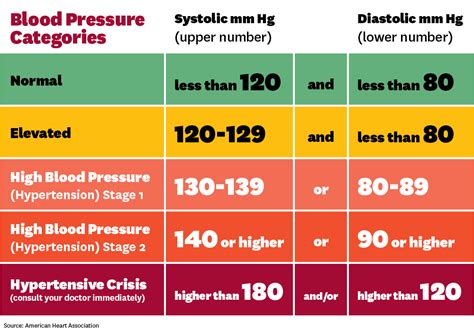Intro
Discover optimal blood pressure levels, including normal, high, and low BP ranges, and learn how to maintain healthy blood pressure through lifestyle changes and management techniques for overall cardiovascular wellness.
Maintaining optimal blood pressure levels is crucial for overall health and well-being. Blood pressure refers to the force of blood against the walls of arteries, and it is measured in millimeters of mercury (mmHg). The American Heart Association (AHA) defines optimal blood pressure as a systolic pressure of less than 120 mmHg and a diastolic pressure of less than 80 mmHg. Achieving and maintaining optimal blood pressure levels can help prevent cardiovascular diseases, such as heart attacks, strokes, and kidney disease. In this article, we will delve into the importance of optimal blood pressure levels, the factors that influence blood pressure, and provide tips on how to maintain healthy blood pressure.
High blood pressure, also known as hypertension, is a major risk factor for cardiovascular diseases. According to the World Health Organization (WHO), approximately 1.13 billion people worldwide suffer from hypertension, and it is estimated that this number will increase to 1.56 billion by 2025. In the United States, the Centers for Disease Control and Prevention (CDC) reports that nearly 1 in 3 adults have high blood pressure. The consequences of uncontrolled hypertension can be severe, including heart failure, coronary artery disease, and kidney failure. Therefore, it is essential to understand the factors that influence blood pressure and take proactive steps to maintain optimal blood pressure levels.
The importance of maintaining optimal blood pressure levels cannot be overstated. Optimal blood pressure levels can help prevent cardiovascular diseases, improve overall health, and increase life expectancy. Additionally, maintaining healthy blood pressure can also reduce the risk of other health problems, such as cognitive decline, vision loss, and kidney disease. Furthermore, optimal blood pressure levels can also improve quality of life, allowing individuals to engage in physical activities, maintain social relationships, and enjoy overall well-being. In the following sections, we will explore the factors that influence blood pressure, the benefits of maintaining optimal blood pressure levels, and provide practical tips on how to achieve and maintain healthy blood pressure.
Factors that Influence Blood Pressure

Genetics and Family History
Genetics can play a significant role in determining blood pressure. Individuals with a family history of hypertension are more likely to develop high blood pressure. Research has identified several genetic variants that can increase the risk of developing hypertension. For example, a study published in the journal Nature Genetics found that a genetic variant in the APOL1 gene was associated with an increased risk of developing hypertension in African Americans.Lifestyle Factors
Lifestyle factors, such as diet, physical activity, and stress levels, can also impact blood pressure. A diet high in sodium, saturated fat, and sugar can contribute to high blood pressure. On the other hand, a diet rich in fruits, vegetables, whole grains, and lean protein can help lower blood pressure. Regular physical activity can also help lower blood pressure, while a sedentary lifestyle can increase the risk of developing hypertension. Stress levels can also impact blood pressure, as chronic stress can lead to increased blood pressure.Benefits of Maintaining Optimal Blood Pressure Levels

Reducing the Risk of Cardiovascular Diseases
Maintaining optimal blood pressure levels can help reduce the risk of cardiovascular diseases, such as heart attacks, strokes, and coronary artery disease. High blood pressure can damage the blood vessels, leading to the formation of plaque and increasing the risk of cardiovascular disease. By maintaining optimal blood pressure levels, individuals can reduce the risk of developing cardiovascular disease and improve overall health.Improving Overall Health
Maintaining optimal blood pressure levels can also improve overall health. Optimal blood pressure levels can improve cognitive function, reduce the risk of kidney disease, and improve quality of life. Additionally, maintaining healthy blood pressure can also reduce the risk of other health problems, such as vision loss, hearing loss, and osteoporosis. By maintaining optimal blood pressure levels, individuals can enjoy overall well-being and improve their quality of life.Tips for Maintaining Optimal Blood Pressure Levels

- Eat a healthy diet: A diet rich in fruits, vegetables, whole grains, and lean protein can help lower blood pressure.
- Engage in regular physical activity: Regular physical activity can help lower blood pressure and improve overall health.
- Manage stress: Chronic stress can lead to increased blood pressure, so it's essential to manage stress through techniques such as meditation, yoga, or deep breathing.
- Get enough sleep: Getting enough sleep is essential for maintaining healthy blood pressure, as chronic sleep deprivation can lead to increased blood pressure.
- Monitor blood pressure: Regularly monitoring blood pressure can help identify any changes or abnormalities, allowing for prompt medical intervention.
Dietary Changes
Dietary changes can play a significant role in maintaining optimal blood pressure levels. A diet rich in fruits, vegetables, whole grains, and lean protein can help lower blood pressure. The DASH diet, which stands for Dietary Approaches to Stop Hypertension, is a well-known diet that can help lower blood pressure. The DASH diet emphasizes whole grains, fruits, vegetables, lean protein, and low-fat dairy products.Physical Activity
Regular physical activity can also help lower blood pressure and improve overall health. The American Heart Association recommends at least 150 minutes of moderate-intensity aerobic activity or 75 minutes of vigorous-intensity aerobic activity per week. Physical activity can help lower blood pressure by improving cardiovascular function, reducing inflammation, and improving overall health.Medical Interventions

Medications
Medications can play a significant role in maintaining optimal blood pressure levels. Diuretics, beta blockers, and ACE inhibitors are commonly used medications to treat hypertension. Diuretics help remove excess fluid from the body, while beta blockers slow the heart rate and reduce blood pressure. ACE inhibitors block the production of a hormone that constricts blood vessels, helping to lower blood pressure.Lifestyle Changes
Lifestyle changes can also play a significant role in maintaining optimal blood pressure levels. Weight loss, sodium reduction, and increased physical activity can all help lower blood pressure. The American Heart Association recommends a weight loss of 1-2 pounds per week, while the CDC recommends reducing sodium intake to less than 2,300 milligrams per day.What is the ideal blood pressure range?
+The ideal blood pressure range is less than 120/80 mmHg.
What are the risks of high blood pressure?
+High blood pressure can increase the risk of cardiovascular diseases, such as heart attacks, strokes, and coronary artery disease.
How can I maintain optimal blood pressure levels?
+Maintaining optimal blood pressure levels requires a combination of lifestyle changes, such as eating a healthy diet, engaging in regular physical activity, and managing stress, as well as medical interventions, such as medications and lifestyle changes.
What is the DASH diet?
+The DASH diet, which stands for Dietary Approaches to Stop Hypertension, is a well-known diet that can help lower blood pressure. The DASH diet emphasizes whole grains, fruits, vegetables, lean protein, and low-fat dairy products.
How often should I monitor my blood pressure?
+It's recommended to monitor blood pressure at least once a year, or more frequently if you have a history of hypertension or other health conditions.
In conclusion, maintaining optimal blood pressure levels is crucial for overall health and well-being. By understanding the factors that influence blood pressure, making lifestyle changes, and seeking medical interventions when necessary, individuals can reduce their risk of cardiovascular diseases and improve their quality of life. We encourage readers to take proactive steps to maintain optimal blood pressure levels and to consult with their healthcare provider if they have any concerns. Share this article with friends and family to help spread awareness about the importance of maintaining optimal blood pressure levels.
